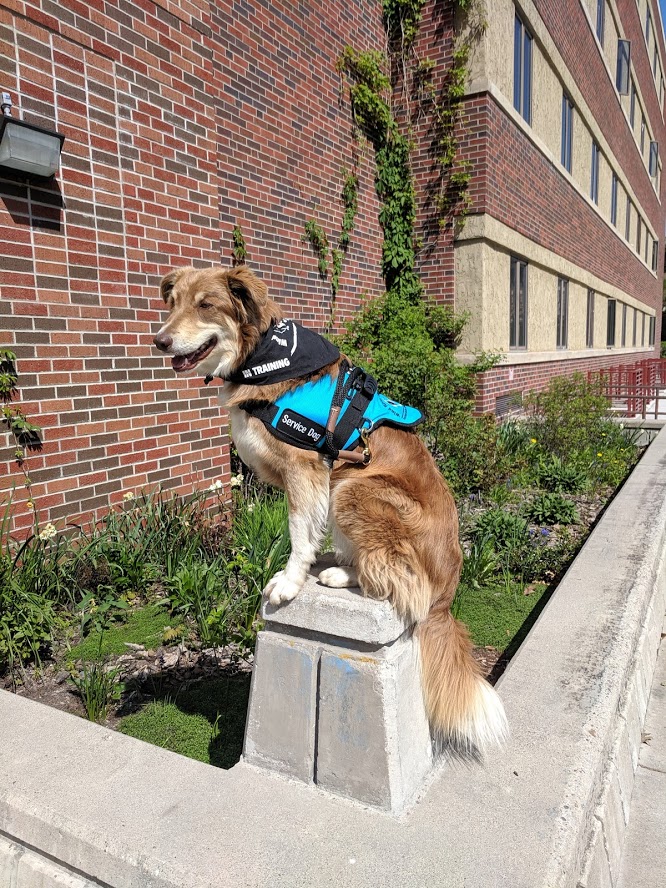Eligibility & FAQs
Questions about our Service Dog ProgramEligibility Requirements
1. Handler must have a legally-recognized disability
Use of a trained service animal is available to a person with a disability only. You can find the federal definition of a disability by > Clicking Here <
2. Handler must have the means to meet the regular care and exercise requirements of owning a dog.
Handlers must have the means to care for a dog, whether that is independently or with family/medical assistance. This includes, but is not limited to:
- Quality food and nutrition
- Adequate exercise
- Grooming requirements
- Regular veterinary care
- Toys, beds, crates, and other supplies.
3. Handler must meet all adoption/purchase criteria from a breeder, rescue, or shelter if acquiring a new dog
Because WRCP does not purchase or retain any legal rights to our clients’ service animals, the client/handler must independently meet any adopting agency/breeder requirements for purchase or adoption of a new dog.
4. Children under 12 years old
Service dogs for young children have more considerations than training a dog for an adult handler, and we work with these types of dogs on a case-by-case basis. For us to design a program for a dog being trained for a child under 12, the following conditions must be met:
- The dog must have an adult handler at all times (a parent, guardian, or other aide/caretaker). This includes during school hours.
- The dog must be able to provide a service that the adult handler cannot (i.e. Diabetic Alert Dog, Autism Assistance dog).
- WRCP does not subscribe to the philosophy of tethering a child to a dog
- A dog accompanying a child during school hours must be an approved accommodation of an Individualized Education Plan.
5. Children 12-17 years old
Children 12-17 years old may be the primary handler for the service dog. However, a parent or guardidan must be present for all training sessions and learn all training techniques as well, and the youth handler must demonstrate an ability to execute and maintain safe training and handling skills, and be able and willing to accept the regular care and other responsibilities of owning a dog.
As with children under 12, a dog accompanying a child to school must be an approved accommodation under an IEP.
6. Transportation and Lodging
Clients are responsible for their own transportation to and from evaluations, private lessons, and transfer lessons. Nonlocal clients are responsible for their own lodging.
We do offer virtual lessons for nonlocal clients, but we cannot assist with service dog training in Canada due to Canadian Service Dog Laws.
7. Funding and Payments
Payment at the time of service is required. Payment plans are available for Board & Train programs. For any clients seeking funding through an alternate source (i.e. Vocational Rehabilitation, Medicaid Waiver, etc.) you must be approved through your assistance program prior to scheduling any training. We must have a Prior Authorization form (for funds to be released) in hand prior to beginning training.
Frequently Asked Questions
Below are some frequently asked questions regarding service dogs and our program.
What is a service dog?
A service dog is defined as “an animal that is individually trained to do work or perform tasks for a person with a disability.” This disability can be physical, mental, emotional, psychiatric, or any other significant impairment to a person’s major life activities.
The tasks or work that a service animal performs must be directly related to and help mitigate the handler’s disability.
For example:
- A person with limited mobility may have a dog trained to retrieve objects for them, open and close doors, and turn on and off lights.
- A person who is diabetic may have a dog that is trained to detect and alert them to high and low blood sugar levels.
- A person with PTSD may have a dog who is trained to recognize signs of extreme distress/panic and interrupt their handler, and provide calming pressure to mitigate the severity of the attack.
These are just a FEW of the things service dogs can be trained to do.
Dogs who provide emotional support and relief of stress from their presence are not considered service animals under the Americans with Disabilities Act.
How long does training take?
Once again, this is dependent upon the age of the dog, the format chosen, and the ability of teams to make progress in between training sessions.
In general, WRCP will not graduate a team unless a dog is at least 18 months of age, and Advanced Public Access training does not begin until a dog is approximately 1 year old.
Training could take as little as 4-6 months or as long as 18 months. Your training consultation will give you an accurate time estimate as well as cost.
Do you have already-trained dogs?
No. We do not breed, raise, or place finished dogs with handlers. We work with clients to train their own dogs, and can assist with selection of a service dog prospect if they don’t already have a dog. However, clients are responsible for the purchase/adoption of their dogs and retain 100% legal ownership.
Which dogs make good service dogs?
Service dogs must have a combination of correct temperament and trainability. They must have a strong deesire to learn and work, and be oriented towards humans. They must also be friendly (or at least neutral) to humans and dogs, and be confident and able to handle many different types of environmental stressors.
About 1 in every 10 dogs has the correct personality for work as a service dog. Wind River Canine Partners does not place any restrictions on the breed or type of dog that can be trained as a service dog, but we will provide recommendations based on the type of tasks needing to be trained as well as the handler’s lifestyle and preferences.
If the work or tasks a dog needs to perform has specific size/weight requirements, we will ensure that a dog is of an appropriate breed/size before beginning training in addition to testing for appropriate temperament.
Do you offer financial assistance?
At this time, we do not have any in-house financial assistance or scholarship programs.
However, in the past we have successfully worked with outside grant, scholarship, and funding assistance programs and are more than happy to partner with or submit necessary information to the program of the client’s choice.
Do you certify dogs?
No. In the United States, there is no federally-recognized certification or registration for service dogs.
We do hold teams in our program to the following training standards for graduation purposes, and these standards comply with federal and state laws:
- All teams must pass the AKC Canine Good Citizen obedience test
- All teams must pass WRCP’s Public Access Test for service dogs
- All teams must be able to perform their disability-related tasks to 90% reliability.
Teams in our program will receive a graduation certificate upon completion of the above requirements.
How much does service dog training cost?
For our program, the cost of training will depend upon a few factors:
- The age of the dog when it begins our program
- The format of training the client chooses (i.e. Board & Train or Private Lessons)
- The ability of a handler/client to maintain training or make forward progress between sessions.
In general, a strictly Private Lesson Program will cost anywhere between about $2,000-$3,000 and a strictly Board & Train program will cost anywhere between $10k-$18k. A combination program will be in between those ranges.
Your initial training consultation will allow our service dog specialists to give you a more accurate quote. These costs do not factor in the purchase price of the dog or travel and lodging requirements.
Will you pick a dog for me?
We can provide you guidelines and advice on choosing the best candidate for your particular needs and lifestyle. For shelter dogs/older dogs, we can also provide you with a temperament checklist to conduct prior to finalizing a purchase or adoption. However, the final decision is up to you. We do not have any legal rights or ownership to your dog.
We will perform a temperament assessment on any candidate dog during our training consultation prior to beginning training.
What if I rent/have a "no pets" policy?
> Click Here < to access service animal law in regards to housing.

